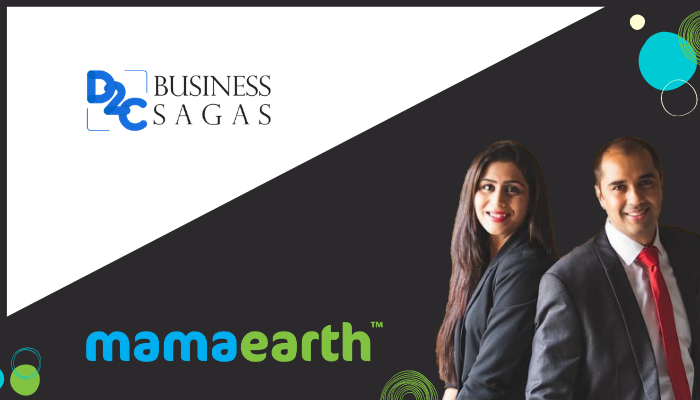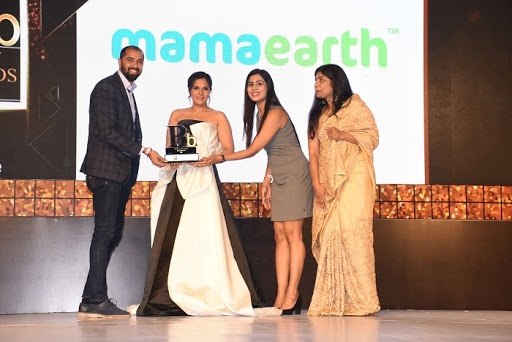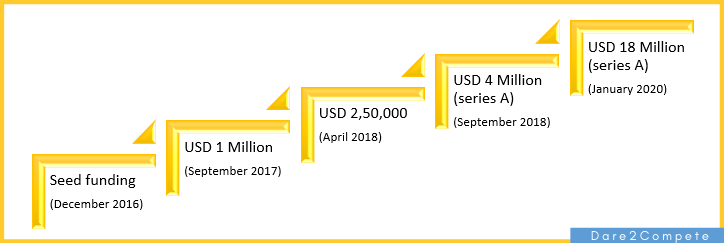The secret behind the booming growth of Made-in-India D2C company, Mamaearth

Devoted to delivering 100 percent non-toxic products in a market dominated by brands from giant FMCG companies, Varun Alagh and Ghazal Alagh, a husband-wife duo launched Mamaearth in December 2016. The success story of this FDA-approved personal care brand dates back to the time when the couple realized that there aren’t any natural and toxic-free baby care products in the Indian market. It was that day, they made up their mind to introduce toxin-free products for the bundles of joy.
From parents to an owner of a 100-crore company
It was never a matter of earning the money and riches for the duo. They went to their wits’ end to fill the vacuum in the industry and offer natural and non-toxic products to the young, informed millennials.
After Varun and Ghazal became parents, the struggle of raising their baby with products that matched the safety standards compelled them to launch a brand under the parent company Honasa Consumer Pvt Ltd, in Gurugram, using the best available natural and effective ingredients. Kick-started with six products in the baby care range, Mamaearth gradually diversified into skin and hair care products for men and women across 80 SKUs along with an introduction of close to 12 new products during the lockdown alone.
The team's grit and grace have catered to over 1.5 million consumers in more than 500 cities across the country. It added another feather to its cap by becoming the first company in Asia to get Made Safe certification - that indicates a comprehensive human health-focused certification for making 100% toxin-free products.

Crossing various milestones, the booming Made-in-India FMCG company, Mamaearth, soon crossed the INR 100 crore turnover mark in just four years! For that matter, it has also been chosen as ‘One of the Best Brands’ in India at the second edition of The ET Brand Festival held last year.
Let’s talk business!
This Made-in-India company is innovating constantly to stay relevant and cater to the dynamic market needs. Let’s dive into the marketing strategy of Mamaearth that multiplied its revenue and resulted in a growth of 3X every year since its inception.
The foremost fact behind the success story of this plastic positive brand in India is its objective of making the world a better place to live. Its initiative like ‘Let’s Recycle’ reflects how hard it strives to conserve mother Earth for future generations of babies, which creates an emotional connection with parents. Its well-liked #MyFirstGoodDeedOf2021 on social media platforms also won the hearts of the people. Here is a glimpse of it:
Another simple yet impactful strategy is the word of mouth. The team of Mamaearth believes in mum-power and thus decided to directly target mothers. The founders were confident that once the customers will use the Mamaearth products, their word of mouth would work wonders for the company. And it happened as planned!
Keeping up with their ideology, Mamaearth sprucely launched a special Mother’s Day Campaign - #MamaearthMummySong last year. The campaign revolved around an all-new peppy song about mothers and the special role they play in our lives, that went viral and dominated platforms like TikTok and Instagram with more than 3M views!

With the business transformation in the era of digitization, they utilized a customer acquisition strategy purely based on digital content. Even during the lockdown, the company used almost 8% of its marketing budget in influencer marketing. The company has a strong focus on influencer marketing and targeted digital funnels by targeting 1000+ mom bloggers, health and fitness YouTubers, and influencers like Gaurav Taneja (Flying Beast), Fittuber, Ayush Mehra, Srishti Dixit, and Varun Sood. Moreover, the brand ambassador of Mamaearth, Shilpa Shetty, who is also an equity investor in the company, is the perfect example of a Mamaearth influencer.
Expanding the pie: The revenue model of Mamaearth
The secret potion of the success of this Made-in-India FMCG company is the lean innovation cycle that helped Mamaearth achieve the current growth rate. It was geared to launch, learn, and scale quickly. This approach helped them focus on customer-specific needs identification. To accelerate their progress, rapid experimentation allowed the validation and improvement of many product concepts on a real-time basis. Without a shadow of a doubt, It aided in increased customer satisfaction and reduced the time-to-market.
The company has already garnered funding of USD 23.3 Million till 2020 from some of the coveted investors like Fireside Ventures, Sequoia India, and Stellaris. A breakdown of Mamaearth’s funding is as follows:

Even after immense direct and indirect competition from MNCs such as Himalaya, Johnson & Johnson, Procter & Gamble, and Unilever along with e-commerce portals like Nykaa, the Sequoia Capital-funded company has raised 150 crores in just 4 years and is planning to have 500 crore business by 2026.
Mamaearth first formulates products that are then produced by contract manufacturers under a license from its own name. It is a digital-first FMCG company whose revenue model is based on the sale of tangible products to the consumers through Direct-2-Customers (D2C) platforms like Amazon, Flipkart, etc., and traditional offline stores. The teams at Mamaearth follow the blue ocean strategy with an omnichannel presence wherein innovative products steer the growth. All in all, Mamaearth is among a slew of new-age consumer brands which have blossomed beautifully in the last few years. The brand is doing great in segmenting, targeting, and positioning and their attention to nitty-gritty can pave the path for a successful Made-in-India skincare brand.
This article was co-authored by Priyanshi Agarwal, in response to D2C Business Sagas. If you'd like to submit your story, click here.
To get more insights on how the business world buzzes, read:
- How Burger King is disrupting the market with its creative campaigns - A Case Study
- The 3 strong co-founder relationships that inspired the world!
- Adding SUGAR to the startup world after IIM Ahmedabad
- 20 famous Case Studies that every MBA student ought to know
- Alibaba and the business of trust: A case study -By Anisha Dhawan from GLIM Chennai
Login to continue reading
And access exclusive content, personalized recommendations, and career-boosting opportunities.
Blogs you need to hog!

What Innovation Does For Efficiency and Competitiveness in a Corporate Sector?

Online to Offline Commerce- Everything one needs to know

How Do You Work Around Branding Guidelines To Be Guidelines And Not Limitations? | Alekhya, Brand Manager- Vivel, ITC | Dove, Unilever













Comments
Add comment